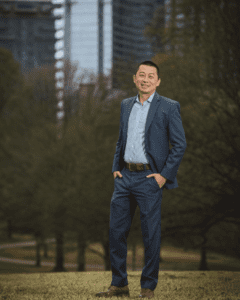
We asked young leaders in fields from business to transportation about the future of Atlanta
Education
Ed Chang | founding executive director, RedefinED Atlanta
What do you love about Atlanta?
Atlanta is culture. There are very few cities where you see diverse leadership, wealth bases, thoughts, and innovation. I think Atlanta means something to the South and to the country when people think about social change, civil rights, and inequities.
What is Atlanta’s most pressing challenge?
Structural racism. Historically, there were laws and systems, such as antiliteracy laws in the early 1800s, that were designed to prevent Black people from learning to read, build wealth, and purchase homes—all of which contribute to the many gaps and disparities we see today. There’s a reason why we are where we are in terms of education. The district was initially created to serve the city’s white population. We had white flight, Black flight, and the proliferation of private schools intersect with redlining. A whole sector of the population was unable to create generational wealth. All of these factors contributed to what we see today, which is one of the largest achievement gaps in the entire country.
What is the city’s most overlooked need?
Right now, we’re in an interesting place and time because of Covid. I’ve heard the words “equity” and “antiracism” thrown around more in this year than I have in my entire life. People are talking now about learning loss, the digital divide, and all of those things. But what I’m hearing less of right now, which I think is important, is that this is an opportunity to actually understand that all of these inequities existed well before Covid happened. Maybe this is a time and opportunity to reshape what the education-delivery system for Black and brown children could be.
What was one lesson of 2020?
There is a newfound appreciation for the roles of families and community in education because we experienced a world where [schools] and teachers, through no fault of their own, had to do herculean efforts to reimagine a digital way of delivering education. Parents and community members had to lean in, in ways that they hadn’t before. Also, quite often, those who have experienced the most inequity and pain have the best solutions because it is their lived experience.
How can people help?
You can think about that from two lenses: little ‘i’ innovation, or the things that we can do on the ground. How can we have more culturally relevant curriculums? How do we ensure that the digital divide is taken care of and everyone has devices? How can you also simultaneously look at big “I” innovation, which are those structural changes? How is this system either challenging or perpetuating the inequities that exist, and how do we reshape and challenge those structural systems?
